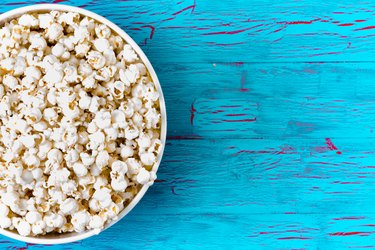
Popcorn is one of America's favorite snacks, and, as a whole, the United States consumes a whopping 15 billion quarts — or 60 billion cups — every year. But while most things are OK in moderation, is eating popcorn every day a good idea? It can be, depending on what the rest of your diet looks like.
The type of popcorn you choose also makes a big difference. While popcorn cooked at home in an air popper or over the stove with healthy oils can contribute antioxidants and good fats, microwave-ready and movie theater popcorn contains artificial ingredients that are better enjoyed only occasionally.
Video of the Day
Video of the Day
Tip
If you're eating microwave popcorn or movie theater popcorn every day, you might be taking in a lot of extra salt and calories, as well as potentially harmful chemicals and artificial ingredients. However, homemade popcorn that's made with olive or avocado oil can be a healthy addition to your daily diet.
Health Benefits of Popcorn
One of popcorn's claims to fame is its fiber content. One cup of popped popcorn contains 6.2 grams of carbohydrates, 1.2 grams of which come from fiber. According to the American Heart Association, the fiber in popcorn not only helps keep you full for relatively few calories — a cup of air-popped popcorn contains only 31 calories — it can also help promote weight loss. Fiber is also known for keeping your digestive system healthy and helping to prevent constipation.
Popcorn also contains significant amounts of certain types of antioxidants called phenolic acids, according to a report that was published in the journal Antioxidants in January 2019. Phenolic acids help fight off damage from free radicals that can lead to chronic diseases like cancer, high blood pressure, diabetes, heart disease, Parkinson's disease and Alzheimer's disease.
The report in Antioxidants also notes that the particular phenolic acids in popcorn are highly bio-available, meaning your body can easily digest and absorb them. Eating popcorn every day, in addition to plenty of vegetables and low-sugar fruits, like berries, is a good way to get in a good dose of these antioxidants.
Choosing the Right Popcorn
Of course, the complete package makes a difference. While the popcorn itself can be a healthy inclusion in your diet, the other ingredients may not be the best choice. If you're opting for microwave popcorn, you'll also be getting artificial flavors and lots of processed salt, according to Cleveland Clinic. Some microwave popcorn bags also contain chemicals called PFOAs and PFOSs, which have been linked to various cancers and thyroid disease, according to the Breast Cancer Prevention Partners.
Another chemical, called diacetyl, that's used in some microwave popcorn butter flavorings has been shown to cause respiratory problems (nicknamed "popcorn lung") when you inhale too much of it. If you're eating microwave popcorn every day, you may be exposing yourself to more of these chemicals than you should. Movie theater popcorn doesn't have the same chemicals as microwave popcorn, but it does contain a lot of salt and oil, according to the American Heart Association.
On the other hand, if you're making your popcorn at home, you can choose the ingredients you use and only add things that contribute to your health, instead of take away from it. If you cook the popcorn in healthy oils, like olive oil and avocado oil, that are rich in monounsaturated fats (which help keep your heart healthy), a small amount of daily popcorn can be a good choice. Just don't overdo it and make sure to stick to the recommended serving sizes.
- Breast Cancer Prevention Partners: "Perfluorooactanoic Acid (PFOA) & Other PFAS Chemicals"
- Cleveland Clinic: "9 Best Tips to Help You Make Healthier Popcorn"
- American Heart Association: "Popcorn as a Snack: Healthy Hit or Dietary Horror Show?"
- Popcorn Board: "Industry Facts"
- Antioxidants: "Analysis of Popcorn (Zea mays L. var. Everta) for Antioxidant Capacity and Total Phenolic Content"
- USDA FoodData Central: "Snacks, Popcorn, Air-Popped"
- International Journal of Molecular Sciences: "The Potential of Plant Phenolics in Prevention and Therapy of Skin Disorders"